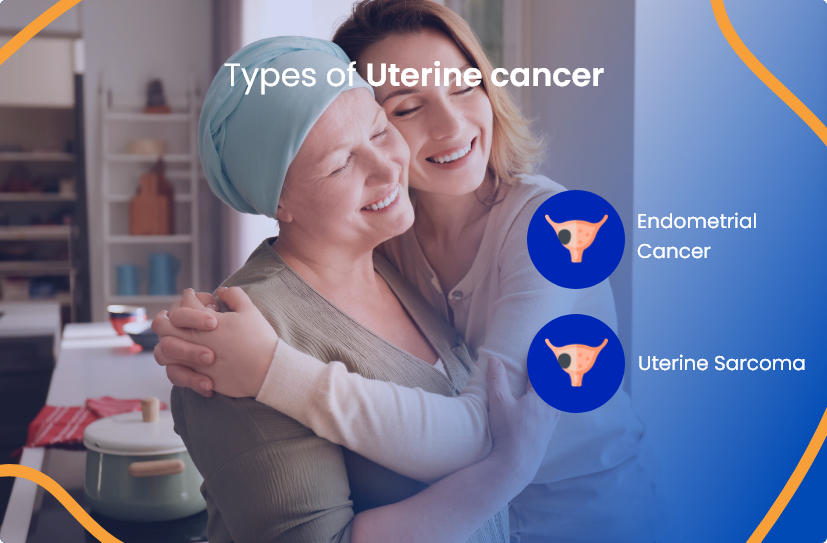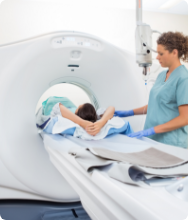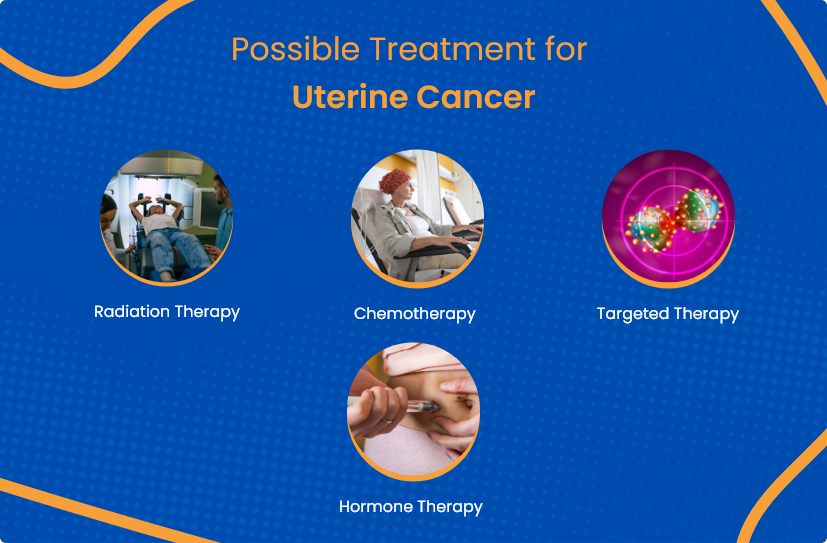
Book a Consultation
Thank you!
Your form has been sent successfully.

Hearing the words “uterine cancer” can be scary—but understanding what’s happening in your body is the first step toward taking control. The uterus (also called the womb) is a muscular organ where a baby grows during pregnancy, but it can also be the site of abnormal cell changes.
When these cells grow out of control, they can form a tumor. That’s what leads to uterine cancer—one of the most common cancers in women around the world. The sooner it’s found, the more options there are to treat it effectively.

Most uterine cancers (over 90%) are endometrial cancers. Endometrial cancer starts in the endometrium, the inner lining of the uterus.
Less commonly, uterine cancer can occur in the muscle wall of the uterus (myometrium) or the supportive tissues. This rarer type is called uterine sarcoma, and it requires different treatment approaches.
Symptoms of uterine cancer may overlap with other conditions, including cervical cancer. You should call your doctor if you notice:
Bleeding or spotting after menopause
Clear or watery vaginal discharge after menopause
Bleeding between periods or unusual bleeding before menopause
Pain or discomfort in the lower abdomen or pelvic area
Experiencing these symptoms doesn’t necessarily mean you have uterine cancer, but it’s important to have them evaluated promptly.
To determine if symptoms are related to uterine cancer, doctors typically recommend a few key diagnostic steps:
Pelvic examination: The doctor checks your uterus and ovaries for abnormalities. They may use a speculum, a tool that gently opens the vagina, to examine your cervix.

Transvaginal ultrasound: This imaging test uses sound waves to produce clear images of the uterus. If the uterine lining appears thicker than usual, a biopsy may be recommended.

Endometrial biopsy: The doctor removes a small sample of tissue from the uterine lining and examines it under a microscope to check for cancer.

Imaging (CT and MRI): CT scans show detailed, three-dimensional images from multiple angles, helping detect if cancer has spread. MRI provides highly accurate pictures of the uterus and helps measure the tumor's size.

These tests help your doctor confirm if you have uterine cancer and, if so, determine the best treatment plan tailored to you.

Treatment for uterine cancer typically involves surgery. Most patients will undergo a procedure to remove the uterus and possibly the ovaries and fallopian tubes.
Other treatment options include:
Radiation therapy: This focuses high-energy beams directly on the tumor. While carefully planned to minimize harm to surrounding healthy tissue, some normal cells may be affected.
Chemotherapy: This can be given intravenously or orally, and helps destroy cancer cells throughout the body.
Targeted therapy: This approach targets proteins or genes involved in cancer growth. Since not all tumors share these targets, tests will identify if this treatment could be effective for you.
Hormone therapy: This may be recommended if your cancer cells have hormone receptors, particularly if surgery or radiation are not options.
Your treatment plan will depend on the specific type and stage of your cancer.
At ACTC in Florida, we understand how personal and overwhelming a uterine cancer diagnosis can feel. That’s why our team delivers care that’s not only grounded in the latest medical research but also shaped by what matters most to you—your comfort, your values, and your goals.
Every treatment plan is tailored by specialists who bring deep experience in gynecologic and general oncology. Whether you're navigating surgery, hormone therapy, or long-term follow-up, we’re here to support your physical and emotional well-being every step of the way.
Meet the ACTC physicians who may be part of your care team:
At ACTC in Florida, our cancer specialists and experienced clinical team have been guiding patients through every step of the uterine cancer journey for more than 20 years. From diagnosis and staging to treatment and long-term follow-up, we provide expert care—all in one trusted, convenient location.
Call 352-345-4565 or book an appointment.

As one of Florida's leading advanced uterine cancer treatment centers, we understand how a cancer diagnosis and treatment impact a person's physical and emotional well-being. Therefore, we work hard to make patients with all forms of cancer and their families feel secure. We provide comprehensive treatment for carcinoid tumors at ACTC, including screening, diagnosis, staging, treatment, and long-term follow-up, all in one convenient location. Our physicians are backed up by qualified clinical staff with over two decades of experience and a reputation for providing individualized treatment.
Schedule a consultation by calling
 352-345-4565
352-345-4565
Many people live well after treatment, especially when cancer is found early. Your outlook depends on the type and stage, so it’s best to discuss your personal prognosis with your doctor.
Uterine cancer does not have one single cause. Risk is higher after menopause, with obesity, and with long-term estrogen-only hormone therapy; ask your doctor how these apply to you.
Common signs of uterine cancer to watch for include:
Bleeding or spotting after menopause
Watery or clear vaginal discharge after menopause
Bleeding between periods before menopause
Pelvic or lower-belly pain
Schedule a consultation by calling
 352-345-4565
352-345-4565